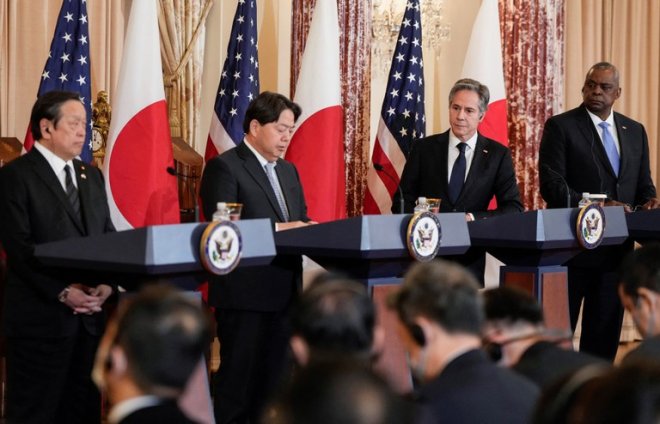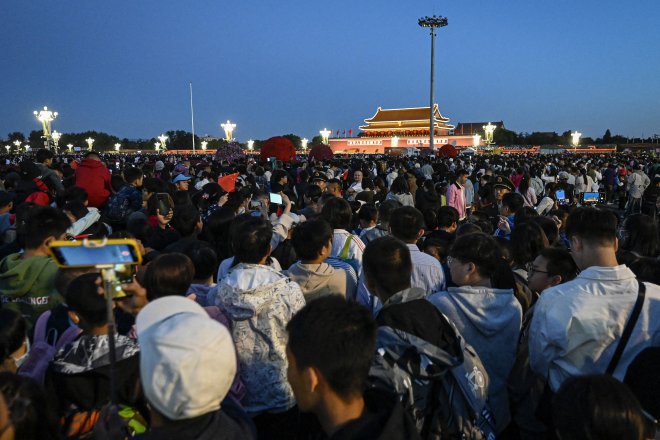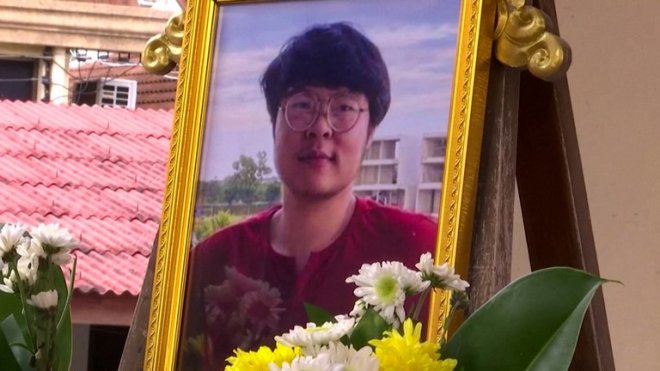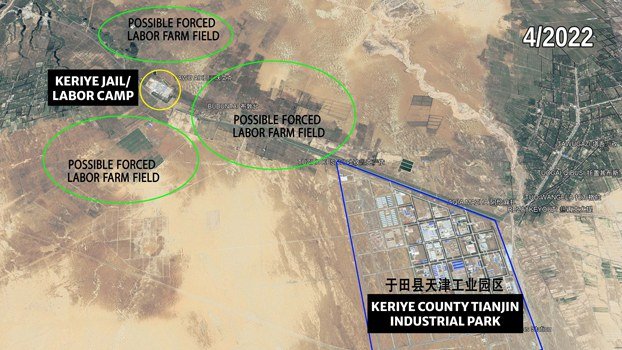US to base mobile Marine unit on Japan’s Okinawa island
The United States and Japan have agreed to further boost their military alliance with a plan to deploy a new Marine unit to an island chain near Taiwan amid rising strategic challenges from China.
Top foreign affairs and defense officials from both countries on Wednesday held an unprecedented meeting of the U.S.–Japan Security Consultative Committee, dubbed 2+2, which U.S. Secretary of State Antony Blinken called “another step toward tightening already incredibly strong bonds” between the two countries.
The two sides announced a military alliance-updating plan that includes the deployment of a new mobile Marine unit in Japan"s southern island of Okinawa.
U.S. Defense Secretary Lloyd Austin said at a joint press conference that the new Marine Littoral Regiment, re-designated from an artillery regiment, is “more lethal, more agile, more capable,” and would “bolster deterrence in the region and allow us to defend Japan and its people more effectively.”
Okinawa, part of the Ryuku (Nansei) Islands, is located just 500 kilometers (310 miles) from Taiwan, the democratic, self-ruled island that China vows to reunify with the mainland.
The presence of the new Marine force on Okinawa will send a clear deterrent message to Beijing which is, in Blinken’s words, “the greatest shared strategic challenge that we and our allies and partners face.”
The U.S. and Japan also said they would expand their security treaty to "attacks to, from or within space,” amid concerns over rapid developments in China’s space program.
Such attacks “present a clear challenge to the security of the alliance" and could invoke Article Five of the U.S.- Japan mutual defense treaty.
Austin is meeting with Japanese Defense Minister Yasukazu Hamada separately at the Pentagon on Thursday, before a summit between U.S. President Joe Biden and Japanese Prime Minister Fumio Kishida on Friday.
![]() U.S. Secretary of State Antony Blinken (CR) and Defense Secretary Lloyd Austin (R) hold a press conference with Japan’s Foreign Minister Yoshimasa Hayashi (CL) and Defense Minister Yasukazu Hamada (L) in Washington, Jan. 11, 2023. Credit: Reuters/Joshua Roberts
U.S. Secretary of State Antony Blinken (CR) and Defense Secretary Lloyd Austin (R) hold a press conference with Japan’s Foreign Minister Yoshimasa Hayashi (CL) and Defense Minister Yasukazu Hamada (L) in Washington, Jan. 11, 2023. Credit: Reuters/Joshua Roberts
Shift in strategy and alliance
Washington has strongly endorsed Tokyo’s recent military buildup, the biggest since World War II and a remarkable shift from Japan’s post-war pacifism.
Last month Japan announced a five-year plan to double its defense budget to 2% of the country’s gross domestic product and focus on acquiring counterattack capabilities.
Tokyo also released a set of new national security strategies, in which China is identified as an “unprecedented strategic challenge.”
"We applaud the commitment to increase investment, to enhanced roles, missions and capabilities ... to closer cooperation not only between the United States and Japan but as well with other allies and other partners," Antony Blinken said.
He said that there is “a remarkable convergence between our strategy – strategies – and Japan"s.”
This week’s events mark “a significant change in the U.S.-Japan alliance,” wrote analysts Zac Cooper and Eric Sayer in a commentary in War On The Rocks, a defense and security portal.
“For the first time in decades, Tokyo and Washington are seriously preparing for the possibility of a major conflict in the near term,” they said, noting that “the U.S.-Japan alliance is shifting to a war footing.”
Japan"s anxieties about a possible Chinese invasion of Taiwan have provided the context for this shift as “for Tokyo containing China is a priority as evident in the Free and Open Indo-Pacific concept,” said Jeff Kingston, a professor at Temple University in Tokyo.
The parallels between Putin and Ukraine and Xi and Taiwan could have helped to create a favorable environment for ramping up defense capabilities and shedding security constraints but “a public backlash is likely when it is presented with the bill,” according to Kingston.
“I think that the surge in the defense budget with no firm plan for funding it and ill-considered plans for the splurge in outlays will come back to haunt Kishida,” he said.
China’s reaction
When asked about the new efforts to strengthen the U.S.-Japan military alliance, a Chinese spokesman said that military cooperation between the two countries “must not harm the interests of third parties or undermine the peace and stability in the region.”
Meanwhile a newspaper affiliated to the Communist Party, the Global Times, ran a commentary slamming the U.S. and Japan for “continuing to undermine regional peace and stability in 2023.”
The paper quoted Li Haidong, a professor at the Institute of International Relations at the China Foreign Affairs University, as saying that “the ostensibly closer U.S.-Japan alliance actually puts Japan in a riskier and more sacrificial position.”
Washington is the last stop in Prime Minister Kishida’s week-long diplomatic tour that also took him to France, Italy, the United Kingdom and Canada.
On Wednesday Kishida and his British counterpart Rishi Sunak signed a landmark defense pact allowing their forces to be deployed in each other’s countries.
[圖擷取自網路,如有疑問請私訊]
Top foreign affairs and defense officials from both countries on Wednesday held an unprecedented meeting of the U.S.–Japan Security Consultative Committee, dubbed 2+2, which U.S. Secretary of State Antony Blinken called “another step toward tightening already incredibly strong bonds” between the two countries.
The two sides announced a military alliance-updating plan that includes the deployment of a new mobile Marine unit in Japan"s southern island of Okinawa.
U.S. Defense Secretary Lloyd Austin said at a joint press conference that the new Marine Littoral Regiment, re-designated from an artillery regiment, is “more lethal, more agile, more capable,” and would “bolster deterrence in the region and allow us to defend Japan and its people more effectively.”
Okinawa, part of the Ryuku (Nansei) Islands, is located just 500 kilometers (310 miles) from Taiwan, the democratic, self-ruled island that China vows to reunify with the mainland.
The presence of the new Marine force on Okinawa will send a clear deterrent message to Beijing which is, in Blinken’s words, “the greatest shared strategic challenge that we and our allies and partners face.”
The U.S. and Japan also said they would expand their security treaty to "attacks to, from or within space,” amid concerns over rapid developments in China’s space program.
Such attacks “present a clear challenge to the security of the alliance" and could invoke Article Five of the U.S.- Japan mutual defense treaty.
Austin is meeting with Japanese Defense Minister Yasukazu Hamada separately at the Pentagon on Thursday, before a summit between U.S. President Joe Biden and Japanese Prime Minister Fumio Kishida on Friday.
 U.S. Secretary of State Antony Blinken (CR) and Defense Secretary Lloyd Austin (R) hold a press conference with Japan’s Foreign Minister Yoshimasa Hayashi (CL) and Defense Minister Yasukazu Hamada (L) in Washington, Jan. 11, 2023. Credit: Reuters/Joshua Roberts
U.S. Secretary of State Antony Blinken (CR) and Defense Secretary Lloyd Austin (R) hold a press conference with Japan’s Foreign Minister Yoshimasa Hayashi (CL) and Defense Minister Yasukazu Hamada (L) in Washington, Jan. 11, 2023. Credit: Reuters/Joshua RobertsShift in strategy and alliance
Washington has strongly endorsed Tokyo’s recent military buildup, the biggest since World War II and a remarkable shift from Japan’s post-war pacifism.
Last month Japan announced a five-year plan to double its defense budget to 2% of the country’s gross domestic product and focus on acquiring counterattack capabilities.
Tokyo also released a set of new national security strategies, in which China is identified as an “unprecedented strategic challenge.”
"We applaud the commitment to increase investment, to enhanced roles, missions and capabilities ... to closer cooperation not only between the United States and Japan but as well with other allies and other partners," Antony Blinken said.
He said that there is “a remarkable convergence between our strategy – strategies – and Japan"s.”
This week’s events mark “a significant change in the U.S.-Japan alliance,” wrote analysts Zac Cooper and Eric Sayer in a commentary in War On The Rocks, a defense and security portal.
“For the first time in decades, Tokyo and Washington are seriously preparing for the possibility of a major conflict in the near term,” they said, noting that “the U.S.-Japan alliance is shifting to a war footing.”
Japan"s anxieties about a possible Chinese invasion of Taiwan have provided the context for this shift as “for Tokyo containing China is a priority as evident in the Free and Open Indo-Pacific concept,” said Jeff Kingston, a professor at Temple University in Tokyo.
The parallels between Putin and Ukraine and Xi and Taiwan could have helped to create a favorable environment for ramping up defense capabilities and shedding security constraints but “a public backlash is likely when it is presented with the bill,” according to Kingston.
“I think that the surge in the defense budget with no firm plan for funding it and ill-considered plans for the splurge in outlays will come back to haunt Kishida,” he said.
China’s reaction
When asked about the new efforts to strengthen the U.S.-Japan military alliance, a Chinese spokesman said that military cooperation between the two countries “must not harm the interests of third parties or undermine the peace and stability in the region.”
Meanwhile a newspaper affiliated to the Communist Party, the Global Times, ran a commentary slamming the U.S. and Japan for “continuing to undermine regional peace and stability in 2023.”
The paper quoted Li Haidong, a professor at the Institute of International Relations at the China Foreign Affairs University, as saying that “the ostensibly closer U.S.-Japan alliance actually puts Japan in a riskier and more sacrificial position.”
Washington is the last stop in Prime Minister Kishida’s week-long diplomatic tour that also took him to France, Italy, the United Kingdom and Canada.
On Wednesday Kishida and his British counterpart Rishi Sunak signed a landmark defense pact allowing their forces to be deployed in each other’s countries.
[圖擷取自網路,如有疑問請私訊]
|
本篇 |
不想錯過? 請追蹤FB專頁! |
| 喜歡這篇嗎?快分享吧! |
相關文章
AsianNewsCast


















